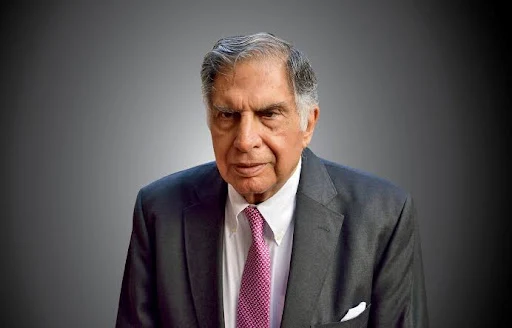"Farewell to Ratan Tata: A Nation Mourns Its Beloved Icon"
Ratan Tata, one of India's most beloved industrialists and a true national icon, has passed away at the age of 86. This loss has left a deep void not only in the Tata Group, which he led with unmatched dedication, but also in the hearts of millions across the country. Just days before his passing, he had reassured the public through a social media post that his health was being monitored due to routine medical examinations, calming the fears of many who looked up to him. Now, the nation mourns the man who left an indelible mark on India’s industrial landscape.
N Chandrasekaran, Chairman of Tata Sons, expressed his sorrow in a statement: “It is with an overwhelming sense of loss that we bid farewell to Mr. Ratan Naval Tata, a leader whose immense contributions shaped the Tata Group and the country. To the Tata Group, he was more than just a chairman. He was a mentor, guide, and a friend, always leading by example. His unyielding commitment to excellence, ethics, and innovation saw the Tata Group grow globally while remaining rooted in its principles.”
Under Ratan Tata’s leadership, the Tata Group expanded far beyond Indian borders, making a significant global impact. However, his influence extended beyond just business. His commitment to philanthropy was just as important. From healthcare to education, his charitable efforts through Tata Trusts have left an imprint on society that will last for generations.
Ratan Tata’s journey with the Tata Group began in 1991 when he took over as chairman of the $100 billion conglomerate. The group had been established by his great-grandfather more than a century ago, and under his leadership, it thrived. He was responsible for some of the group’s most notable achievements, including the launch of Tata Consultancy Services (TCS), which went public in 2004, and the acquisition of iconic British car brands Jaguar and Land Rover in 2008, which showcased the strength of an Indian company on the global stage.
A key milestone of his career came in 2009 when he fulfilled a promise to deliver the world’s most affordable car, the Tata Nano, priced at just Rs 1 lakh. Though the car's success was limited, it became a symbol of innovation and a testimony to Tata's vision for making products accessible to the common man.
Even after stepping down as chairman in 2012, Ratan Tata’s legacy continued. He was named chairman emeritus of Tata Sons and several of the group’s key companies, including Tata Motors and Tata Steel. His involvement in the group’s charitable trusts meant that even in retirement, his vision of corporate responsibility lived on. Sadly, the deep personal feud with Cyrus Mistry, who succeeded him as chairman but was ousted in a high-profile boardroom coup, remained unresolved before Mistry’s tragic death in 2022.
Ratan Tata was not just a business giant but also a man of great personal humility. He was known for his love of animals, especially dogs, and was a regular social media user, sharing touching posts that resonated with the public. His presence on social media platforms like X (formerly Twitter) and Instagram made him the most followed Indian entrepreneur, further cementing his connection with the people of India.
Born in 1937, Ratan Tata’s early life was marked by personal challenges. After his parents separated in 1948, he was raised by his grandmother, Navajbai Tata. He studied architecture at Cornell University and later attended a management course at Harvard. Despite being a bachelor, he once revealed that he had come close to marriage four times, with one poignant story involving a love he had to let go during the Indo-China war in 1962.
His contributions to the country did not go unrecognized. In 2000, he was honored with the Padma Bhushan, India’s third-highest civilian award, and in 2008, he received the Padma Vibhushan, the second-highest. These awards underscored the depth of his contributions not just to Indian industry, but to the nation as a whole.
Though Ratan Tata is no longer with us, his legacy lives on. His life's work—leading the Tata Group to unparalleled heights, his philanthropic endeavors, and his influence on India’s business ethos—will continue to inspire future generations. For all he achieved, Ratan Tata will be remembered not just as a successful industrialist, but as a man who believed deeply in doing good for society. His absence leaves a void that can never be filled. The nation mourns the loss of a true icon.
The Tata Group and India as a whole are left grieving for the man who embodied integrity, leadership, and compassion. His influence transcended industries and touched the lives of countless individuals. While the country reflects on his life and contributions, his impact will endure, and his memory will be cherished forever.
Key phrases: Ratan Tata, Tata Group, national icon, industrialist, philanthropist, innovation, leadership, global impact, India’s growth, philanthropy, Tata Trusts, Tata Nano, Jaguar-Land Rover acquisition, Cyrus Mistry feud, Padma Vibhushan, Tata Sons, social media influence, legacy, Bombay House, stray dogs, Indian business ethics.

Comments